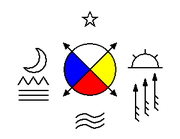Lipan Apache Band of Texas
 Flag of the Lipan Apache Band of Texas | |
| Named after | Lipan Apache people, State of Texas |
|---|---|
| Formation | 1999[1] |
| Founded at | Edinburg, Texas[1] |
| Type | Nonprofit organization[1] |
| US Texas TIN 32001461261[1] EIN 742953145[2] | |
| Legal status | active |
| Location | |
Membership | 745 (2022)[3] |
Official language | English |
Chairman | Richard Gonzalez (2022)[4] |
| Affiliations | Texas Tribal Buffalo Project |
| Website | lipanapachebandoftexas |
The Lipan Apache Band of Texas is a cultural heritage organization of individuals who identify as descendants of Lipan Apache people[1] The organization LABT is based in Edinburg, Texas;[1] with members living in Texas, Louisiana, California, and Mexico.[4]
The Lipan Apache Band of Texas is an unrecognized organization. They are neither a federally recognized tribe[5] nor a state-recognized tribe.[3][6]
Other unrecognized organizations who also identify as Lipan Apache descendants, including the Apache Council of Texas (Alice), Cuelgahen Nde Lipan Apache of Texas (Three Rivers), the Lipan Apache Nation (San Antonio), or the Lipan Apache Tribe of Texas (McAllen).
Organization[edit]
The Lipan Apache Band of Texas, Inc., became a 501(c)(3) nonprofit organization in 1999.[1] It is based in Edinburg, Texas.[1]
Daniel Castro Romero Jr. is the registered agent.[1]
Officers of the organization include:
- Director, and agent: Daniel Castro Romero Jr.
- Director: Richard A. Gonzalez
- Director: Rudy S. Perez
- Secretary: Virginia C. Romero[1]
Many members of the Lipan Apache Band of Texas left the organization to join the Lipan Apache Tribe of Texas, which incorporated in 2007, after a dispute involving Daniel Castro Romero Jr.[7] In 2022, Richard Gonzalez became the tribal chairman.[4] The Texas State Senate passed a congratulatory resolution to honor the Lipan Apache Band of Texas.[8]
Petition for federal recognition[edit]
In 1999, Daniel Castro Romero Jr. of San Antonio submitted a letter of intent to petition the U.S. federal government for recognition of the Lipan Apache Band of Texas, Inc.;[9] however, the group never followed up with a complete petition for recognition.[10]
Activities[edit]
The Lipan Apache Band of Texas hosts an annual powwow in Fort Clark Springs, Texas, which has been honored in a congratulatory resolution.[11] Each March, they participate in a living history celebration at Fort Clark.[4]
The Mexican state of Coahuila invited LABT members to visit for a cultural exchange in 2009.[8] In 2012, the group worked with the University of Texas Human Rights Clinic and LAW-Defense to create an "Early Action/Early Warning procedure report to stop racial discrimination.[8]
Lucille Contreras, an LABT member, launched the Texas Tribal Buffalo Project in 2021. She purchased 77 acres (31 ha) in Waelder, Texas;[3] formed a nonprofit organization; and developed a herd of American bison.[4] The Nature Conservancy helped provide five bison to the project.[3]
Notable members[edit]
- Margo Tamez, historian, poet[12]
See also[edit]
References[edit]
- ^ a b c d e f g h i j "Lipan Apache Band of Texas, Inc". OpenCorporates. Retrieved December 16, 2023.
- ^ "EIN/TAX ID : 742953145 : LIPAN APACHE BAND OF TEXAS INC". HIPPA Space. Retrieved December 16, 2023.
- ^ a b c d Denetclaw, Pauly (February 22, 2022). "Five Buffalo Returned to Lipan Apache Lands". Native News Online. Retrieved January 10, 2024.
- ^ a b c d e Baddour, Dylan (July 2, 2022). ""Labeled 'Hispanic'"". Texas Observer. Retrieved January 10, 2024.
- ^ "Indian Entities Recognized by and Eligible to Receive Services From the United States Bureau of Indian Affairs". Indian Affairs Bureau. Federal Register. January 21, 2022. pp. 7554–58. Retrieved December 15, 2023.
- ^ "State Recognized Tribes". National Conference of State Legislatures. Archived from the original on September 1, 2022. Retrieved April 6, 2017.
- ^ Leal, Ashley (December 2016). "Lipan Apache tribe of Texas: Ethnic and racial identity". ScholarWorks. Edinburg, TX: University of Texas Rio Grande Valley. p. 20. Retrieved December 16, 2023.
- ^ a b c Leza, Christina (2019). Divided Peoples: Policy, Activism, and Indigenous Identities on the U.S.–Mexico Border. Tucson: University of Arizona Press. p. 98. ISBN 9780816540556.
- ^ "Indian Issues: Federal Funding for Non-Federally Recognized Tribes" (PDF). Government Accountability Office: 45. April 2012. Retrieved January 10, 2024.
- ^ "Office of Federal Acknowledgment (OFA)". Indian Affairs. U.S. Department of the Interior. Retrieved January 10, 2024.
- ^ "Texas HR540 Commemorating the 2011 Fort Clark Days and the Lipan Apache Band of Texas Pow Wow". TrackBill. Retrieved December 16, 2023.
- ^ Patrick, Diane. "New and Forthcoming Titles on Indigenous Peoples". Publishers Weekly. Retrieved December 16, 2023.
External links[edit]
- Lipan Apache Band of Texas, official website
- Texas Tribal Buffalo Project
